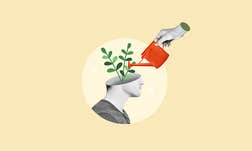In some ways, Richard Dawkins has been thinking about contingency for most of his life.
The book that catapulted him to fame, The Selfish Gene, is about one kind of contingency, which shapes genetic codes and chooses winning species (and genes). This contingency is nested in many others. In his memoir, An Appetite For Wonder, Dawkins imagines a dinosaur that would have caught and eaten the shrew-like ancestor of all mammals, had it not sneezed. “We all can regard ourselves as exquisitely improbable,” he writes.
Then there are the contingencies of an individual life. Is it true, Dawkins wonders, that “the course of a named individual’s life is sucked back, magnetically, into predictable pathways, despite the Brownian buffetings of sneezes and other trivial, or not so trivial, happenings?” Would Dawkins still have been Dawkins, had he been raised in a religious household? If he’d had different tutors?
In this video, Harvard poetry professor Elisa New sits Dawkins down in a lush field outside the Aspen Institute and talks to him about the most famous American poem on the topic of contingency, Robert Frost’s “The Road Not Taken.” The conversation was recorded as part of New’s initiative, Poetry in America, which brings poetry into classrooms and living rooms around the world.
To see the video interview, click the “play” button at the top of this article.
Interview Transcript
Elisa New: I am so happy to be here with Richard Dawkins, the evolutionary biologist, the elegant science writer, and advocate for science. Richard is also a lover of poetry—I learned last year when we spent a week or so together on vacation. What I’d love to do is to ask you, Richard, to read the quintessential classic—maybe the best-known American poem—Robert Frost’s, “The Road Not Taken.” After you read it we’ll talk about it because I know you have a perspective on this poem and draw understanding from it that’s unusual and, for me, opens the poem up.
Richard Dawkins: “The Road Not Taken,” by Robert Frost.
Two roads diverged in a yellow wood,
And sorry I could not travel both
And be one traveler, long I stood
And looked down one as far as I could
To where it bent in the undergrowth;
Then took the other, as just as fair,
And having perhaps the better claim,
Because it was grassy and wanted wear;
Though as for that the passing there
Had worn them really about the same,
And both that morning equally lay
In leaves no step had trodden black.
Oh, I kept the first for another day!
Yet knowing how way leads on to way,
I doubted if I should ever come back.
I shall be telling this with a sigh
Somewhere ages and ages hence:
Two roads diverged in a wood, and I—
I took the one less traveled by,
And that has made all the difference.
New: Before we discuss this poem, I want to say a word and ask a question about your reading. You are a very natural—and it’s very clear, experienced—reader of poetry. How did it happen? You read a poem as if it were one of your natural modes of expression.
Dawkins: You have to, obviously, read it for what it means. Not read it in a, kind of, sing-song way because it’s written in lines. On the other hand, you don’t want to lose the rhythm of it completely. I think some poetry readers go so much for the meaning that you almost forget that it’s written in scanning lines at all.
New: You read it musically and I wonder about other poems that belong to you, that you know. If you could talk a little bit about what it means to know a poem by heart and to hear it in your own voice.
Dawkins: I’ve loved poetry ever since I was a very young man and most of what I have in my head comes from that time. I’m less good at remembering it now, I think. I have poetry in my head from that time. I’ve got a theory, which I’d be interested to know what you think of it. The first lines of poems are particularly poetic and I think it’s a very mundane reason, that as you thumb your way through an anthology you read the first lines and it’s the familiarity. Familiarity is key, I think, to really appreciating poetry.
New: I agree, and I think there’s a sensation of returning to a place you’ve been before. That first line, it’s the beginning of a path. I know the satisfaction I feel and a comfort of having particular first lines in my head. What are some first lines in yours?
Dawkins: Oh gosh. “Be you still, be you still trembling heart.” That’s Yeats. I don’t know. It’s just a thought I had, but there may be nothing special about first lines at all, it’s just that they’re more familiar. Another thought I had about appreciating lines as especially poetic: Translations sometimes come out a bit strange and the strangeness also has a poetic feel to it. I think, for example, of the King James Bible. Something like the Song of Saul, not the Song of Solomon. By the way Solomon had nothing to do with it. But something about the strangeness of the translation.
New: It gives one a special consciousness of the language. Right? In poetry, that is one of the things poetry does and, in fact, the form and the music of poetry estranges content, or the theme, just enough so that we can see it and hear it, and hear it in a slightly different way. But I didn’t want to pursue our discussion without noting that if one wants to know what an experienced reader of poetry, who loves poetry, sounds like, this is it. This is it.
Now, you’re a biologist and a scientist and you might not expect that Robert Frost’s “Road Not Taken” would have found any place in your thinking, in your work, and yet I know that it does and it has.
Dawkins: Well, I’m fascinated by the idea of how if the tiniest thing had been different at any time of history, the whole of history would be different. One way I expressed it was to say if a particular dinosaur had not sneezed at a particular moment, none of us would be here. The entire existence of the mammals depends upon the survival of an ancestral mammal, which would have been eaten by that dinosaur if it hadn’t sneezed at the crucial moment. Obviously, I made that up. But something equally random and trivial, if Adolf Hitler’s father had not sneezed at a particular moment years before he conceived Hitler …
New: You’re offering these homely examples, but they are, in fact, grounded in science. Tell me where they’re grounded.
Dawkins: Let’s say in science, the contingent fact that that ancestral mammal survived rather than be eaten by that dinosaur. It’s a gigantic thing that happened and yet, at the time, it was just a sneeze, it was just absolutely trivial. The example of Hitler’s father sneezing, that comes from the fact that at every conception one sperm hits an egg out of millions of sperms and if a different sperm had hit that egg, the whole of history would have been different.
New: That reminds us, of course, that these accidents or these contingent events are happening at every second.
Dawkins: Absolutely every second. Anything we do now is going to, by knock-on effect, change the whole of the future history and that is a fantastic, frightening thought. But I don’t think it’s really refutable, I think it’s almost obvious because … There’s an interesting poem by Aldous Huxley—not an American, but he lived in America most of his life—Can I …
New: We’ll welcome him as a resident alien.
Dawkins: Okay. It really expresses the point about the lack of your being conceived.
New: Yes, and we’ll let him lead us back to just a line or two.
Dawkins: Okay.
A million million spermatozoa,
All of them alive:
Out of their cataclysm but one poor Noah
Dare hope to survive.
And of that billion minus one
Might have chanced to be
Shakespeare, another Newton, a new Donne—
But the One was Me.
Shame to have ousted your betters thus.
Taking ark while the others remained outside!
Better for all of us, froward Homunculus,
If you’d quietly died!
New: That’s very funny and makes precisely your point … And it’s a point that if we look together at the Frost … Where is the line? Frost is aware of this, I think, and I want to talk about this especially with you, this sense that anything might have happened, because the common reading of this very, very familiar poem is different from what you’ve just been describing. I think that it’s probably in the third stanza that we come closest to that marvelous and awe inspiring fact of every moment’s contingent balancing on another moment. That stanza that goes:
And both that morning equally lay
In leaves no step had trodden black.
Oh, I kept the first for another day!
Yet knowing how way leads on to way,
I doubted if I should ever come back.
Dawkins: I think that’s different.
New: You do?
Dawkins: As you say, the conventional reading of the poem is more about individuality and human decision-making and the power of the human to take a road and …
New: Yes and that has made all the difference.
Dawkins: I’m talking about something different, but you can certainly read it here. I think it’s in the title, “The Road Not Taken.” There are roads not taken at every moment in history and the entire history of the world is changed because of these utterly trivial choices of taking one road rather than another. I’m not talking about human individuality, I’m talking about absolutely everything where there’s a divergence.
New: Yes. What difference, what consequence can an effort of human choice make? I think that that is a question raised by this poem and a question with stakes for all of us who know it, who know the poem.
Dawkins: The philosophical question of determinism is not something I want to get into, but it’s obviously related. I am interested in … You can do this game after conception. Once we were conceived, then everything else became far more likely. However, any decision that we did take, in more of a Robert Frost-type decision, the decision to, I don’t know, to marry a particular person—these are big decisions, of course—go to a particular university rather than another one …
New: Just this verb, diverged. Divergence is a word scientists use as well as …
Dawkins: But I’m interested in the possibility that there might be a kind of magnetic pull to bring you back to the path, for example—because I’ve written my autobiography recently and it’s on my mind—if I had not got into Oxford, say, or if I had not chosen to do research on animal behavior and done it on biochemistry as I almost did. It’s almost obvious I would not have written the books that I’ve written, but might there have been a magnetic pull bringing me back to something like what I would have done anyway?/p>
New: And what force is that?
Dawkins: Well, it’s something to do with personality, something to do with the way an individual is made.
New: We desire … And I think this poem, actually, lets us think about how we desire that magnetic pull.
Dawkins: Yes, yes. That’s right.
New: Right?
I shall be telling this with a sigh
Somewhere ages and ages hence:
Two roads diverged in a wood, and I-
I took the one less traveled by,
And that has made all the difference.
Dawkins: That had made all the difference, but it’s possible that it didn’t make any difference and that he would have been dragged back to the same path. I think that’s an interesting question, although I’ve emphasized the luck of particular roads traveled.
New: But you don’t want to call that magnetic pull …
Dawkins: Well, I don’t mind calling it magnetic pull as a sort of poetic allusion. It is at least interestingly arguable that a particular individual has some sort of drive to become a scientist, or to become a poet, or to become an artist.
New: A drive, rather than fate or a providential plan written in.
Dawkins: Yeah. And so, although the road taken actually did make a very big difference to the actual course of that person’s life, there could have been a pull back because that person really, really, really wanted to be a scientist or a poet or whatever it might be and that dragged him back.
New: It’s very interesting, also, that you’re talking about a pull and dragging where this poem is very, very deliberate.
Long I stood
And looked down one as far as I could
To where it bent in the undergrowth;
There’s all this forethought and deliberation and an insistence on forethought and deliberation that, I think, you are arguing somewhat against …
Dawkins: Well, no I’m sure that happens. It’s just that there are two different messages you can get out of this poem and they’re not incompatible.
New: No, I think they’re shifting all the while and Frost is helping us to see how the randomness and the contingency of events, our own predisposition and intellectual determination, these two factors influence each other. But then also, our mythologizing after the fact, that there is the way in which there is a story of our lives we tell. Right? “I shall be telling this with a sigh,” I should be writing my memoir—ages and ages hence. I think he is telling us, also, why human beings want to read stories of lives and the story of your life, at least it’s packed opening chapters that you’ve written is so compelling because of the somewhat Frostian …
Dawkins: I think you can get different things from a poem and it probably shouldn’t be read in only one way.
New: Yeah.
Dawkins: I think we probably demonstrated this rather well in discussing this particular one.



























